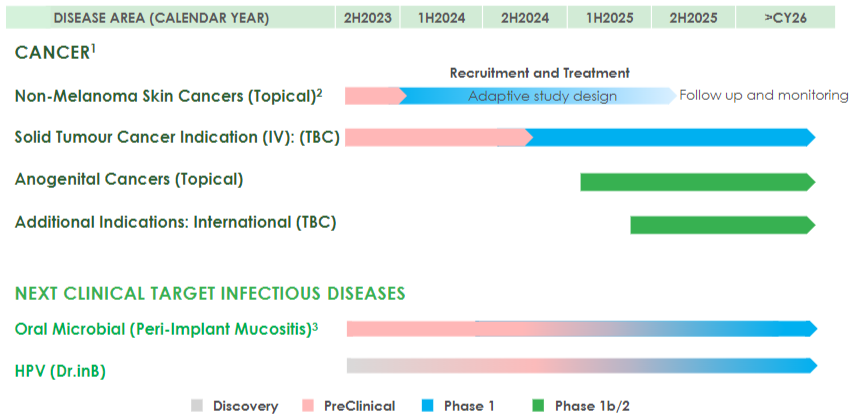Invion (ASX:IVX): Using Photodynamic Therapy to fight cancer
![]() Nick Sundich, September 9, 2024
Nick Sundich, September 9, 2024
Unless you’re a professional dermatologist, you may not have ever heard of Photodynamic Therapy, let alone thought of it as an option to fight cancer as Invion (ASX:IVX) is doing.
Invion may not appear to be an appealing investment at first glance, given its status as a ‘penny stock’ with a share price as a fraction of a cent, not having the highest liquidity amongst ASX stocks and still being at an early stage from a clinical perspective – it could be several years before we see Photosoft as a commercial reality. But that does not mean the company should be discarded. There could be some upcoming catalysts that investors should watch for.
Photosoft
Photosoft is a type of Photodynamic Therapy (PDT) that Invion is using to target various cancer and non-cancer indications. Photodynamic Therapy (PDT) is a medical therapy involves the use of a photosensitising compound, oxygen and light to generate destructive reactive oxygen species (ROS) for killing cancer cells selectively and promoting anti-cancer immune response.
It is less invasive than surgery, has minimal side effects and offers an alternative treatment option that can help achieve tumour regression and long-lasting remissions. As we will address later in the report, PDT has potential to help with other medical indications, although the most research has been conducted against cancer.
When PDT is used as a cancer treatment, a drug called ‘photosensitising agent’, which is preferentially taken up by cancer cells , is administered to the patient. When the patient is selectively exposed to light beams at a wavelength corresponding to the absorption band of the photosensitiser, the drug produces activated oxygen molecules that damage nearby cells.
INV043
INV043 is Invion’s leading drug candidate and represents the NGPDT that aims to treat multiple types of cancers. It is a compound the company has that can be administered topically or intravenously, has greater cancer-killing potential, and has been shown to elicit an anti-cancer immune response in animal models.
Proof of Concept (PoC) studies of INV043 have shown that it is selectively absorbed by cancer cells, is effective in regressing multiple cancer types in vivo and stimulates the body’s natural immune response. It also works additively with blockbuster ICI drugs, is non-toxic, safe, has limited side effects, and supports translations into successful clinical trials
Invion achieved substantial progress by working with Hudson Institute for the development of INV043 which is an improvement over the previous APIs. INV043 has greater anticancer activity and better cancer-targeting characteristics than previous generations of APIs developed by the company, including the original Photosoft.
Progress is being made slowly
The company’s share price would suggest that little has occurred over the last couple of years, after progress between May 2021 and May 2022.
In May 2021, the company reported strong proof-of-concept testing results based on research undertaken with the Hudson Institute. The study found that INV043 had 600x greater photoxicity than the most widely used photosensitizer (talaporfin sodium), and could distinguish between malignant and healthy tissues. Moreover, the research showed significant regression in vivo in multiple cancer models including T-cell lymphoma, triple negative breast and pancreatic cancer. Invion has a Co-Development, Distribution and License Agreements with RMW Cho Group to co-develop Photosoft. This agreement originally only covered cancers in ANZ but now covers infectious diseases as well as most of the Asia Pacific.
Further results from proof-of-concept pilot studies were released later in the year and the study showed spectacular results for Photosoft – specifically for triple negative breast cancer (TNBC), albeit in only 12 mice. Invion raised capital twice during the 2021 calendar year. Unfortunately, the Biotech Bear Market began around the 2nd quarter of 2022 as interest rates rose at the most rapid pace in decades. This led to many biotech companies – particularly early-stage companies – being sold off by investors. Although it appears the worst of the market is over now, stocks that are years away from commercialisation have been slow to recover.
But in the past couple of years, Invion has:
- Undertaken further studies, including with the Peter MaCallum Cancer Centre and these have shown similarly strong results,
- Expanded its deal with Cho Group into further territories,
- Signed a collaboration agreement with major South Korean pharmaceutical Group Hanlim for the treatment of glioblastoma,
- Signed a collaboration agreement with Dr. I&B Co. (another South Korean company) to develop Photosoft for HPV,
- Worked towards expanding Photosoft to other infectious diseases including mucositis and Human Papilloma Virus (HPV).
What’s next?
The next step is human clinical trials in cancer. It anticipates commencing recruitment for a skin cancer trial later in CY24.

Source: Company
One legitimate concern investors may have is the company’s capital position. The company had less than $1m in cash as of June 30, 2024 – only enough to last approximately 4 months or so. Although it has boosted its cash position since then by receiving $1.2m from US institutional investor Lind Partners (with its total investment potentially being up to $6.8m), there will be more capital required to get the company into and through clinical trials.
And as good as it is for Invion to have Cho on its side, the deal isn’t the most generous with Invion having to co-contribute 25% of pre-clinical costs and 75% of clinical costs. Some later-stage biotech companies have licensing arrangements with their partners paying a higher proportion of the costs.
Conclusion
Investing in early-stage biotechs is very risky and can take much time for investors to realise a return, if at all. However, it appears Invion is finally on the right track, set to commence human clinical trials before this year is out. The next 12 months promise to be exciting for investors.
What are the Best ASX Stocks to invest in right now?
Check our ASX stock buy/sell tips
Blog Categories
Get Our Top 5 ASX Stocks for FY25
Recent Posts
This Time is Different: Marcus Templeton said this phase was costly in 1933, but here is when it may be true
‘The investor who says, “This time is different,” when in fact it’s virtually a repeat of an earlier situation, has…
The Canadian Securities Exchange is buying the NSX! So will Australia finally get a legitimate second exchange?
The big news for Australian investors this week isn’t rate cuts or what Trump may or may not do on…
RBA Cuts Rates Again: Which Sectors Are Set to Benefit Most from This Decision?
The Reserve Bank of Australia (RBA) has recently cut the official cash rate by 25 basis points, marking the latest…



